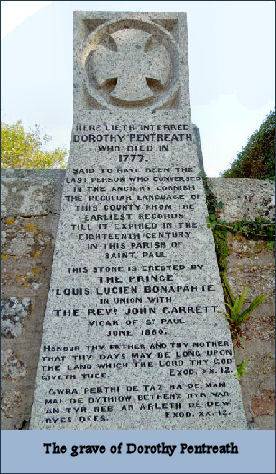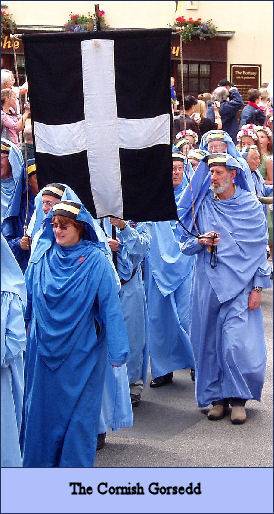The Cornish Language
 Cornish is a branch of the ancient Brythonic Celtic family of languages, belonging to the same linguistic group as Welsh, Breton and extinct Cumric. The name Cornwall itself derives from the name of an ancient Celtic tribe, the Cornouii, who once inhabited the area, and the Anglo-Saxon word for foriegner 'Wealas', from which Wales is also derived.
Cornish is a branch of the ancient Brythonic Celtic family of languages, belonging to the same linguistic group as Welsh, Breton and extinct Cumric. The name Cornwall itself derives from the name of an ancient Celtic tribe, the Cornouii, who once inhabited the area, and the Anglo-Saxon word for foriegner 'Wealas', from which Wales is also derived.
Cornish diverged from Welsh towards the end of the seventh century A.D. Use of the language gradually declined as communication routes with the rest of the country progressed until in Elizabethan times it was confined to the southern limits of the county, west of Truro.
The Cornish language has been extinct for many years. Its last reputed speaker was Dorothy Pentreath of Mousehole, who died in 1777, her gravestone with its Cornish inscription can be seen at St. Paul's church at Mousehole.
As with many other "last native speakers", controversy exists over Dorothy Pentreath's status. After her death, the antiquary Daines Barrington received a letter, written in Cornish and accompanied by an English translation, from William Bodinar, a fisherman from Mousehole, who claimed that he knew five people who could speak Cornish in Mousehole alone. Barrington also reports of John Nancarrow of Marazion, a native speaker of Cornish who survived into the 1790s.
John Davey, a farmer and schoolteacher of Boswednack, Zennor, near the north coast of the Penwith, who died in 1891, also conversed in Cornish, a memorial stone at Zennor church was erected by the St Ives Old Cornwall Society in his memory. John Mann of Boswednack, Zennor, was the last known survivor of a number of traditional Cornish speakers of the nineteenth century, he was said to have conversed in Cornish with other children, and was still alive at the age of 80 in 1914.
Many Cornish place-names survive, such as Tre as in Trebetherick and Trelissick and many more Cornish place names means a homestead and its nearby buildings. The Cornish prefix Pol as found in Polperro, Poldhu, Polzeath, Polruan, means a pool and Pen as in Penzance, Pendennis, Penryn, Pentire, etc means an end of something, a headland or head. Some Cornish words still appear in the English spoken in Cornwall today. The language underwent a revival in the latter half of the twentieth century. Fishermen were known to count fish in Cornish up until the 1940's.
There are vivid traces of the language in place names such as Mullion (mullyon - clover) and Marazion (Marghas Deth -Yow Thursday market) that add to Cornwall's individual character. It survives also in characteristic Cornish surnames beginning with Tre, Pen and Pol, (tre - farmstead, pen - head and pol - pool)
The language has been revived by support provided by a small group of enthusiasts, who keep alive a knowledge of Cornish.
The Gorseth Kernow
The Gorseth Kernow exists to keep alive the national Celtic spirit of Cornwall and to promote the use of the Cornish language, literature, arts, music and history.
It achieves this by awarding Bardships to individuals for outstanding work in Cornish culture at an annual ceremony known as the meeting of the bards. The Gorseth Kernow (Gorsedd of Cornwall) was set up in 1928 at Boscawen-un by Henry Jenner, one of the early proponents of Cornish language revival, who took the name "Gwas Myghal", meaning "servant of Michael". He and twelve others were initiated by the Archdruid of Wales. It has been held every year since, except during World War II. 1,000 people have been Cornish bards, including Ken George, R. Morton Nance ("Mordon") and Peter Berresford Ellis.
The three major Gorseths in Britain are recorded in an ancient Welsh triad as being held at Moel Merw and Bryn Gwyddon in Wales and Boscawen-Un in Cornwall (ref: Craig Weatherhill). After domination of the Brythonic Celts by the Saxons the Bardic tradition fell into disuse and despite attempts at revival over the centuries lost all its prestige.
Some Cornish words

als - cliff, arvor - coast, avon - river.
bara - bread, broder - brother, bronn, bre - hill.
carreg - rocks, chy - house, davas - sheep.
dinas - castle, dowr - water.
edhen - bird, eglos - church.
glann - river bank, gorowyji - lighthouse,gras - blue, gwinn, gwidden - white.
hwoer - sister
kan - song, Kernow - Cornwall, kommel - cloud, koth - old.
llan - enclosure.
marner - sailor, melyn - mill, men - stone, mor - sea, morryb - seaside.
norvys - earth, noweth - new.
pen - head, headland, parc, plen - field, pol - pond or pool,
ruth -red
skath - boat
tre - town, farmstead, treth - beach
Pirates, Smugglers and Wreckers of Cornwall
External Links
The Brythonic Celtic Family of Languages